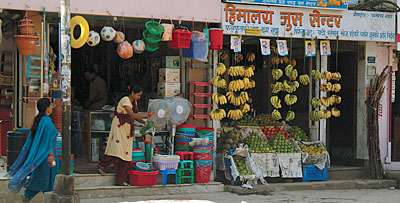 ANUP PRAKASH |
Nepali politicians appear to believe in the phrase 'ignorance is bliss'. Why else would they choose to pay no attention to the issues of the economy?
Listen to what the lawmakers at the Public Accounts Committee have to say on electricity tariffs or the speeches of our politicians on topics ranging from culture to agriculture. One thing they consistently ignore is the economic aspects of the same. Cost issues take a back seat whether we discuss PLA integration or the management of dwindling public corporations such as Nepal Airlines. Transport syndicates have made the cost of transporting goods on the Arniko Highway ten times more expensive than transporting goods on the East West Highway, but who cares? Rastriya Banijya Bank and Nepal Bank Limited continue to be an experiment for donors as part of financial sector reform program even though pure Nepali management has successfully turned around Lumbini Bank.
The country, however, is still not a failed state, as most 'parachute consultants' would like it to be, perhaps by the grace of Pashupatinath. In a year that was governed by an ineffective prime minister and lackadaisical government, GDP has still managed to grow at 3.5 per cent and the growth of disposable income has not abated. Companies are going to post good profits and the banks will report profit growth despite the liquidity crisis. One MNC CEO quipped, "Can you believe we can deliver such results despite keeping factories closed for 150 days? Imagine our performance if we could operate at full capacity". This sentiment may sum up the state of the Nepali economy.
While the growth in the formal market may not be visible, the informal sector is buzzing with activity. No wonder restaurants that don't provide VAT bills do a roaring trade. The cash made by plundering natural resources like forests, river beds and medicinal herbs is never counted in income computations. Immigration businesses run under the garb of educational consultancies and NGOs and non-profit organisations make money in the name of health and education. But political parties have their mouths zipped as these illegal money makers generously fill the party's coffers; so what if the state's treasury is running empty? In any case the government coffers are too often seen as a transit point.
Economic growth could accelerate if the government took initiatives and action-based responses to some questions. Is loadshedding better than buying electricity at prices a quarter of what people spend on running inverters and generators? Are private power producers really welcomed by the government? Could a consistent supply of fuel through private operators instead of getting adulterated fuel after standing in long queues be a solution to the fuel shortage? The government could pool large amounts of untapped funds by setting laws relating to mutual funds and collective investment. It could promote investments rather than be happy that the Foreign Investment Department is not overloaded with applications. The government could put in place a labour law that promotes efficiency and productivity rather than maintain the status quo of political unions working against the interest of labour and enterprises.
A new government will be formed and perhaps this beed will probably write a similar note at the end of the next fiscal year, but one can hope that, like in India, the private sector will begin to defend its own turf rather than fight its own little wars, like the politicians.
READ ALSO:
Muddy waters, PRASHANT JHA
Social in the capital, RABI THAPA
Multitracking South Asia, PUBLISHER'S NOTE
I Love Prachanda, RANJAN ADIGA



